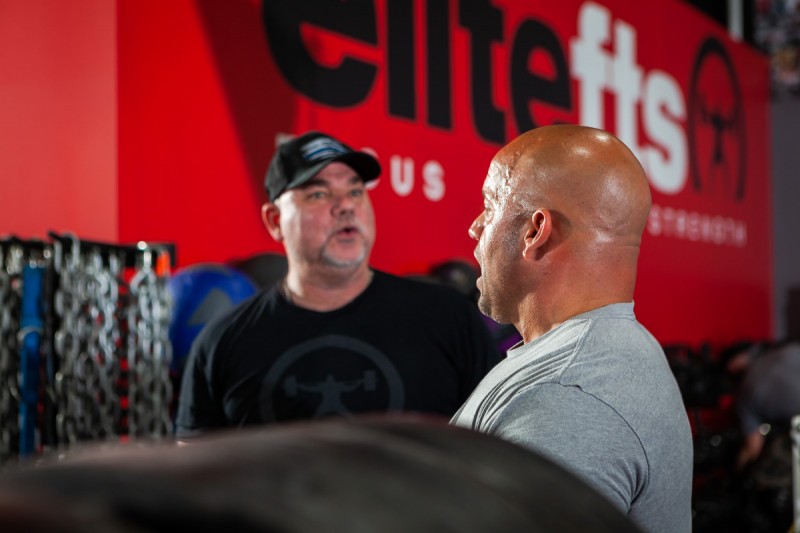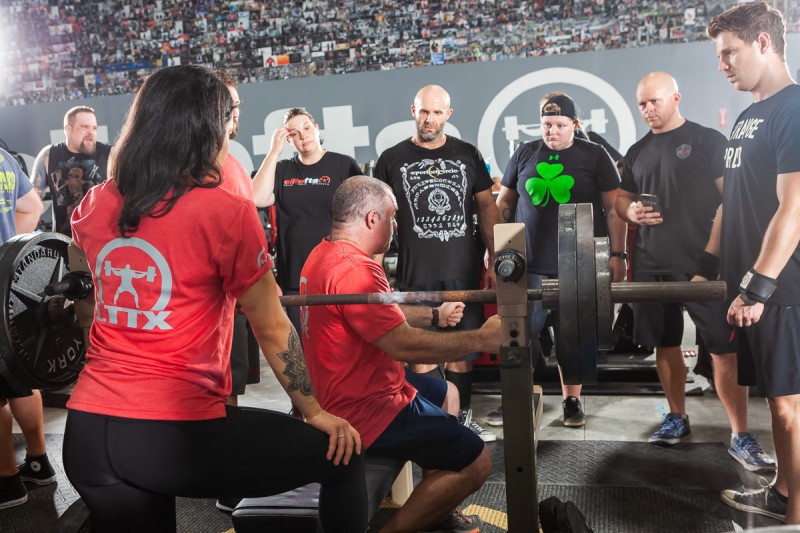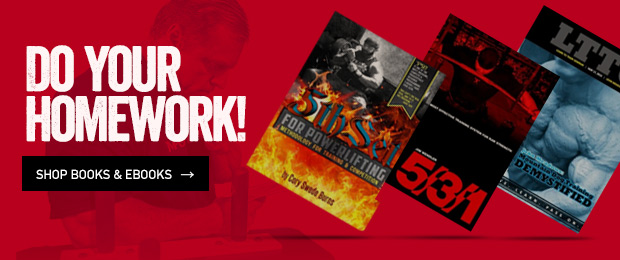
How do you reach a respectable level of proficiency as a strength coach? Where do you even begin to improve yourself as a strength coach? More importantly, how do you stay a strength coach?
With a question. That’s how you begin.
There is an axiomatic fact in this life of ours: you will ultimately obtain what you want. The precursory proclamation is a bitter pill to swallow, and many regurgitate it because of the inherent harshness of the declaration itself. You get what you want.
RECENT: The Strength Coach's Guide to Brazilian Jiu-Jitsu
It is a philosophical bend that is unforgiving and brutally apathetic. Nevertheless, it is the truth. This perception maintains that unless the personal plights and proverbial speed bumps of your story result in victory, then they are simply excuses.
One may aptly extrapolate from the preceding that the introduction of this article coldly purports, “If you didn’t procure your dream, you simply didn't want it enough.” While it may seem harsh, it is said with benevolence. Reality is cold, and we must accept responsibility as well as the inevitability of pain.
The responsibility we bear has tremendous power for good. No matter the course, there is generally a fashion in which you can facilitate the transformation of your hopes into reality, often by attending to it at a particular capacity specific to your constrictions.
There is a Brazilian Jiu-Jitsu black belt I was fortunate enough to coach after dual ACL replacement. He was a brown belt at the time, and in order to get back on the mat to obtain a belt promotion, he was in desperate need of strength. Bear in mind that a lone ACL replacement is a career-ending injury. BJJ was this man’s livelihood and his sole source of income. With two cadaverous ACLs, he spent more time in the weight room than anyone I’ve ever worked with, culminating in the appropriation of his black belt, or what we call his blood belt.

Some may levy that, “It’s different, he had no choice because it was his job.” Wrong. His level of intellect and tenacity would have enabled him to pursue other avenues of revenue, which he did, in fact, peruse in case his body left him no other option. Ultimately, he found that his option was, in fact, singular; obtain his black belt and continue teaching and sparring. Steven Crocilla Jr., a black belt under Fabio Clemente, wanted it. He mutated an idea, a dream, into a tangible outcome. It is now his reality.
Many martial arts practitioners are restricted by time and familial and fiscal obligations to an extent that prohibits their devotion to the art on a full-time basis. Once their day job liabilities cease, they arrive punctually at an academy to teach and train, only to finally dote on their loved ones for a few precious moments after a 13-hour day. Innumerable strength coaches have experienced this same devotion to an ideal. Powerlifters find time before or after work to train. Sacrifices are calculated and accepted. The collateral damage is weighed and embraced.
I define myself by my profession. Coaching strength and conditioning is as inextricably linked to my persona, as is my role as a dutiful son. As the only child of a single mother, I believe the antecedent conveys how important coaching is to me. Consequently, the trials I was bound to face were acknowledged as a requisite facet of the journey.
As the adage goes, “Man plans, God laughs.” Visions I had early on in my career regarding where I would be at this point in time were completely misguided, and, as stated below, I could not be more content with the outcome. Myriad decisions I made, mental health issues, death, loss, and discouragements, including but not limited to the political arena that is collegiate sports, shaped my career path and the destination I have now arrived at professionally.
One can’t predict the shape their personal plights will take, but one can accept that such times are inevitable. The solution is to appreciate trials as reinforcement of the significance of adherence to a routine; otherwise, we are destined to refer to said moments as excuses for our inability to live our dream.
Personally, a sizeable portion of my routine is questioning and reading. These two beacons, so indispensable and potent, have steered my focus so much so that I have been able to coach for a decade in spite of myriad setbacks. I wouldn't trade being in my hometown of Brooklyn, New York, coaching Jiu-Jitsu competitors, some of whom have annexed world championships and Pan-American championships, along with clientele ranging from the general population to military hopefuls for a head coach position in the SEC. Coaching is teaching. As teachers discover their preference for a particular grade or subject, we as coaches unearth our predilections, whether it is strength development or the high school level instead of the collegiate realm.
The overarching point is that throughout these past 10 years, I have endured crucibles that could have easily and adversely rerouted the course of my life, both as a man and as a coach, had they been perceived as excuses. You may find examples in my previous article, “The Yoke: A Measure of a Person’s Intangibles.”
Your defining moments will be when you’re faced with making the distinction between an excuse and reinforcement. Life is a matter of response. At 30 years of age, I have witnessed enough heartache for a lifetime. Yet, a beautiful transformation occurs. You begin to accept crucibles as happenstances as natural as the sun rising in the east. Smiles and cries. Difficulties are as inherent to our lives as breathing.

How do you respond? Again: questioning and reading. For strength coaches, there is nothing more substantive to our daily lives than questions and books. Do you diverge from the routine?
As coaches, we are constantly telling people what to do, but their true desire will determine their personal outcome within the weight room. Coaches mold the environment and have a profound impact on the lives of the people they work with. Yet, it will always be up to the individual being coached to skip a repetition, perform the set amount, or execute an additional rep. You will actualize what you truly desire. Although we hold athletes to this convention, do we apply the same standard to ourselves?
This field is fit for the intrinsically motivated. Those dependent on others to propel themselves forward will fall to the wayside. What determines one’s greatness is what one does in solitude.
What is it that you do when you are alone? Primarily, you must ask questions. What books should I read? How do I structure this in-season cycle? How do I formulate in Excel? Secondarily, you must pick up a book. You must write a program. You must lift in solitude before or after you’ve dispensed tremendous energy mobilizing a multitude of athletes, or clients.
If you are fortunate enough to have a mentor, then propose field-related inquiries until he or she is observably annoyed. Ask until you receive the highest honor: a book from your mentor’s personal library.
READ MORE: 12 Rules for Becoming a Better Strength Coach
Remain mindful that if you have been given a text by your mentor, then it means one of three things:
- You have been so inquisitive that they believe the only way for you to progress at this point is by undertaking the material yourself;
- In spite of your lack of inquisitiveness, they believe in you and bequeath that source to you unsolicited;
- Or they believe you’re not progressing at a sufficient rate, and your knowledge of the text in coming weeks will ascertain the future of your professional relationship.
Common misconceptions that halt the upward trajectory of one’s analysis and subsequent ascertainment of information relative to exercise science are as follows:
- The information is deemed extraneous to the demands of the job, as only a rudimentary understanding of physiology and kinesiology is considered necessary on that person’s behalf to adequately perform the position’s responsibilities;
- The professional allows the level of competition at which they coach to dictate their impetus for learning;
- Soviet-era manuals are too difficult to comprehend;
- Or there is not enough time to read, nonetheless digest the material.
Such is the human condition, to neither rise nor fall but meet mediocrity head-to-head, eye-to-eye, and discover that one has been ensconced in its false comfort for far too long. Inertia is an unfortunate idiosyncrasy shared by all, and we either battle that wretched predisposition to retain a lack of movement or progress. As expressed earlier, our drive, not our circumstance, commands our outcome.
Therefore, we are capable of, and consequently responsible for, accepting the brilliance of Verkhoshansky’s texts and attendant difficulty of cognizing its contents.
We are entrusted to proclaim that it matters not the level of competition we are coaching, but who we are leading and act accordingly to incessantly read in order to purvey our high school, JUCO, Divisions I, II, or III, Power 5, or professional athletes with the best conceivable programming.
We must be candid enough with ourselves to concede that we do have time to read and that there exists no level of knowledge that is extraneous to our duties as coaches. Strive to be the smartest version of yourself and to surround yourself with those amongst whom you are the most uninformed.
If you are the sole strength coach at your establishment or institution, books serve as inimitable colleagues amongst whom you know the least.
Indispensable texts for the strength coach:
- Special Strength Training Manual For Coaches by Yuri Verkhoshansky and Natalia Verkhoshansky
- Supertraining by Yuri Verkhoshansky and Mel Siff
- Science and Practice of Strength Training by Vladimir Zatsiorsky
- Westside Squat and Deadlift Manual by Louie Simmons
- Iron Works Preparation by Buddy Morris and Ryan Williams
- Powerlifting by Dan Austin and Bryan Mann
- Under The Bar by Dave Tate
- 531: The Simplest and Most Effective Training System for Raw Strength by Jim Wendler
Max Barnhart, MA, CSCS, has been involved in collegiate strength and conditioning at the NCAA Division I level for eight years. In addition to coaching, Max has been fortunate enough to publish two articles in NSCA publications and to conduct his master’s thesis on the reduction of the bilateral deficit and concomitant effects on extroversion and personality type. Max’s true passion is the optimization of student-athletes’ athletic and personal potential through strength training and through raising mental health awareness among such populations.










